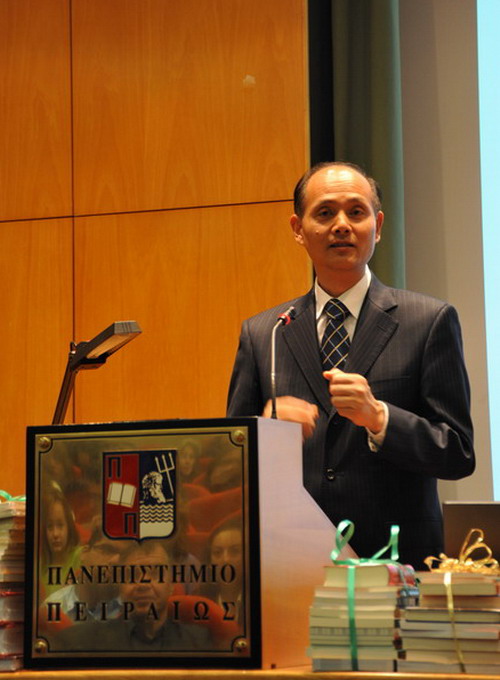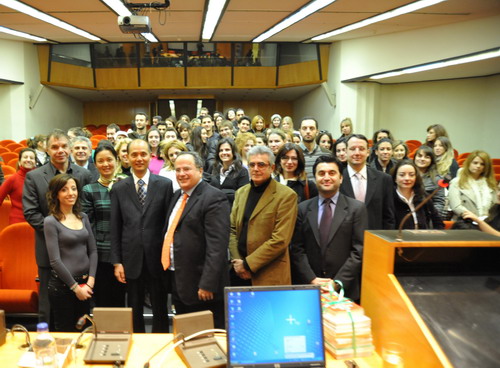| Remarks on Foreign Policy and Climate Change by Ambassador Luo Linquan at Pireaus University |
| 2009-12-13 00:33 |
 On December 11, Chinese Ambassador Luo Linquan delivered a speech at
Remarks by Ambassador Luo Linquan Professor Niko Kotzia, Young Ladies and Gentlemen, Kalimera. Thank you for having me here. I appreciate the strong interest you show for I am glad to know you have a good In --The primary task of China's diplomacy is to promote development, at home and abroad, together with the rest of the world. For example, we played a positive role in international response to the financial crisis. Trade with A new thinking on development, the Scientific Concept of Development, has an important bearing on diplomacy. Our challenge is not only a low per capita GDP, one-tenth of The environment awareness is also transforming the way of our development and diplomacy. More people will know that In short, sustainable development is a mission for Chinese diplomats, and a major source of contemporary Chinese foreign policy. --Secondly, as a responsible power, China plays an important role for regional and world peace. We pursue an independent foreign policy for peace. We adhere to the norms and principles enshrined by the United Nations. We make friends with all countries on the basis of mutual respect and equality. We never draw lines according to ideology, nor form any military alliance. We work towards a fair, rational international order, more democratic ways of international relations. We stand for respect, reconciliation and mutual understanding among diverse civilizations. We are a major force in maintaining world peace, an important player in regional structures and international system. --Thirdly, our diplomacy is people-centered and global- minded. Today's world is a multi-polar, globalizing and interdependent one. We should focus on the social and economic welfare of the people, not to worry too much about a major war. We shall seize the opportunities and confront the challenges of globalization. We find ourselves in a world where Chinese people are closely connected with other nations. We cannot succeed without the rest of the world, and vice versa. Take the relations with the EU and We support the UN Millennium Development Goals. We act on the ground. We committed additional development assistance to our African friends in November. We will build for --Fourthly, China's diplomacy is guided by values and principles. Traditional values are mental sources of We have a vision of building towards a Harmonious World of lasting peace and common prosperity. Our efforts to promote development, maintain peace, and build partnerships are guided by principles. A) Respect the diversity of the world. We should dialogue and learn from each other, rather than demonize those different. B) Treating one another as equals. C) Create win-win economic relations. D)Set up new Security Concept, consisting of mutual trust, cooperation and common security. After two world wars and one cold war, countries shall not pursue absolute security at the cost of others, nor should international disputes be resolved through bullying or imposing wars on the weaker. These principles are fundamentals for Such a world is the ultimate vision of Chinese diplomacy. --I cannot make a lecture without mentioning the focus of world attention. So allow me to shed light on the UN Climate Change Conference in First of all, we need find it out: why is there today's climate change challenge? Climate change doesn't happen overnight. It was caused by the unrestrained greenhouse-gas emissions of the industrial countries for centuries. From 1850 to 2005, one trillion and one hundred twenty-two billion (1.1222 X 1012) tons of carbon dioxide was discharged into the atmosphere by the human activities. Of this total, industrialized countries emitted 806.5 billion tons, or 72%, while the European Union accounted for 27%. Of course, the British and Germans were the biggest polluters. As for recently, in 2006, less than one billion of industrialized population, discharged 12.9 billion tons of CO2, 46% of the year's total emissions. In comparison, 1.3 billion of Chinese population discharged 5.6 billion tons, less than 20% of the world total. Who should be responsible for climate change? The industrialized or the developing world? The United Nations Framework Convention on Climate Change has the answer: common but differentiated responsibilities. That means, industrialized countries, as the largest dischargers of GHGs, should do more to mitigate the climate change. What do the scientists say about emissions cut targets? Industrialized countries should at least cut emissions by 40% in medium term, and provide funds, technologies and capacity building supports to the developing countries. What obligations do the industrialized countries have, according to Kyoto Protocol? A) Cut emissions by 5.2% on 1990 basis. B) Transfer funds and technologies to developing countries. How well have these been fulfilled? Most industrialized countries increased their emissions, some even by 30%. For 20 years, no developed country ever transferred climate change fund or technology to developing countries as Kyoto Protocol prescribed. Secondly, what role does The Chinese people have woken to the climate and environment threat. We have been embracing cleaner development, backed with policy and action. --From 1990 to 2005, China has decreased its GDP carbon intensity by 46%, while the industrialized world has only lowered 26%. --Our industries were required to achieve clean development. Projects with high emission can no longer go ahead and some existing high emitters are being phased out, which means job losses for many who need them. We have cut down average consumption of coal per unit of power by 20%, by demolishing the high-polluting and inefficient power plants. But it led to the loss of 400,000 jobs. --We have increased the share of cleaner alternative energy sources. Low-carbon and energy conservation have become new growth sectors in --China has planted 2.6 billion trees, more than any other country in the world. That is 2 trees per individual, an incredible number. --The only means for China to achieve its voluntary reduction targets is through science and technology. This is why At the UN climate change summit in September, President Hu Jintao stated that According to the International Energy Agency, if I hope you will appreciate the demanding nature of this task. We have already closed down many of the old factories, and the easier part is done. Particularly, we are a developing countries where 135 million people are living off less than one dollar a day. For many Chinese, development is not about rethinking the modern wasteful way of life. Rather, it is a matter of "to be or not to be". We are still in the process to provide electricity to all villages. We have a long way to go to build up a basic medical care system for all citizens. We have to fulfill the task of Millennium Development Goals. We have to enable more people to get out of subsistence. We will try to do so in an environment-friendly way, and of course, at affordable costs. Before I nag you to sleep, I draw your attention to a few numbers. An average Chinese person's CO2 emission is 4.6 tons. A Briton emits 8.7 tons. An American 20 tons. Yet a French climate analyst is accusing For Thank you all.
|
|

